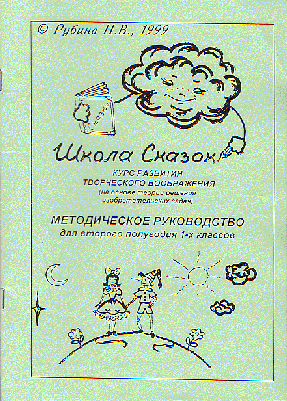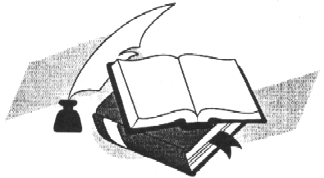Course of Creative Imagination Development (CID) Based on TRIZ, 1st Grade, 2nd Semester, Methodical Guide-Book
English translation by Irina Dolina (Tokyo, Japan) Mar. 13, 2001
Technical Editing by Toru Nakagawa (Osaka Gakuin Univ.) May 1, 2001
List of posting in this Home Page:
| May 8, 2001 | 1st Grade/2nd Semester "Fairy Tales School" | Preface, Intro., Topic 1-2 | Guide-Book | Workbook |
Editor's Note:
Please refer to the Editor's Preface (by T. Nakagawa) and the Author's
Introduction (by N. V. Rubina) on the top page of this Course textbook
series.
| Top of this page | Contents | Front Cover | Symbol marks | Weekly Topic Planning | CID Course Top Page |
Contents
of the CID Course, 1st Grade, 2nd Semester Course
Top Page:
| Book Title;
Grade/Semester |
Contents | Guide-
Book |
Work-
book |
Posted
date |
| "Fairy
Tales School"
1st Grade,
|
Introduction and Weekly Topic Planning | May 8,
2001 |
||
| Invitation to the Fairy Tale
(Introductory Lesson) |
May 8,
2001 |
|||
| 1. Fairy Tales about the systems
(Reviewing) |
May 8,
2001 |
|||
| 2. Fairy Tales from the word "why" | May 8,
2001 |
|||
| 3. "Spoiled" Fairy Tales. | May 8,
2001 |
|||
| 4. Constructor for the Fairy Tales
(Propp's Cards) |
May 8,
2001 |
|||
| 5. "A Fairy Tale is not true, but
there is a hint in it."
(Proverbs) |
May 8,
2001 |
|||
| Appendix 1. "Yes-No" from the Fairy
Tales
Appendix 2. Commentaries to Propp's Cards Appendix 3. Proverbs for the works in class |
-- | May 8,
2001 |
(C) N.V.Rubina,
I. Dolina, T. Nakagawa, 2001
Fairy Tales School
Course
of Creative Imagination Development (CID)
(Based on Theory of Inventive Problem Solving
(TRIZ))
METHODICAL GUIDE-BOOK
First Grade, Second Semester
Natalia V. Rubina
 |
 |

Fairy Tales School
Course
of Creative Imagination Development (CID)
(Based on Theory of Inventive Problem Solving
(TRIZ))
METHODICAL GUIDE-BOOK
First Grade, Second
Semester

Natalia V. Rubina
Petrozavodsk 1999
English Translation by Irina Dolina, March 13, 2001
Technical Editing by Toru Nakagawa, May 1, 2001
The program of the CID course was elaborated and defined in Petrozavodsk in 1996. Six workbooks with special methodological recommendations (for each semester) were worked out. The program and all the methodological material were probated on the basis of the "TRIZ Laboratory" at the Petrozavodsk School #17.
This pamphlet introduces
the methodological instructions for the secpmd semester of the CID first
grade ("The Fairy Tales School").
"The Fairy Tales School". Creative Imagination Development Course for the elementary school (The second semester of the first grade). Methodological instructions.
Reprints and distribution only by author's permission.
For better
perception the following symbols are used in the methodical guide-book:
 |
- problems. For the first grade simple problems demanding answers "yes-no" are used. The major notions of the methods of solving problems are studied in the second and third grades. That is why the most suitable form for solving creative problems is a game "yes-no". The rules of the game are not difficult. After the problem is introduced the kids start to look for the solution by asking questions to which the teacher replies "yes" or "no". The aim of the game is to find a solution by asking as many questions as possible. |
 |
- activities. During these activities it is important that the kids understand how this or that notion may be used for solving the problems, for obtaining new ideas, etc. |
 |
- psychotechnical games. This is a specific part of the lesson. Kids may relax a little and turn to their inner world, the world of a child's fantasy. It goes without saying how important is the atmosphere of trust, friendliness in your small community. |
 |
- speech developing activities. We all know very well how easy to speak with a person, who can ask interesting questions. CID classes are structured in a form of a dialogue, therefore actually any task is an exercise on speech developing. Nevertheless, devising their own riddles, proverbs, tales, the kid learns not only to say "full sentences", but develops a need to formulate his idea in such a way that he would be understood and his wits and humor be assessed. Describing various systems, solving unusual problems, the kids enrich their vocabulary all the time. |
 |
- designing a creative product. Don't be confused by an unusual term. "Creative product" is something finished, designed by the kids with the help of methods they study (a riddle, a proverb, a tale, a model of a toy, articles of natural materials and others). |
 |
- tasks-pictures. At the CID classes there are many activities like that because a new creative idea is often embodied in images, especially it refers to the kids with a strong visual representative system. Most of these tasks are unique stuff for a psychologist, for attentive parents, because in this pictures the inner world of a child is reflected as if in a mirror. |
Weekly Topic Planning
(1st Grade, 2nd Semester)
| Date | Theme | No. of hours | |
| January | 1st week | Invitation to the Fairy Tale (Introductory Lesson) | 1 hour |
| 2nd week | Topic 1. Fairy Tales about the systems (Reviewing) | 1 hour | |
| 3rd week | Topic 2. Fairy Tales from the word "why"? | 1 hour | |
| February | 1st week | Topic 3. "Spoiled " Fairy Tales. | 1 hour |
|
March
|
2nd week
3rd week 4th week 1st week 2nd week |
Topic 4. Constructors for the Fairy Tales
(Propp's Cards) |
5 hours |
|
April |
3rd week
1st week 2nd week |
Topic 5. "A Fairy Tale is not true, but
there is a hint in it."
(Proverbs) |
3 hours |
| 3rd week | Trip in the Fairy Tales | 1 hour | |
|
4th week |
DKR.
What to check:
|
1 hour |
|
| May | 1st week
2nd week 3rd week |
Reviewing of the first grade studies | 3 hours |
[Translation Note 1: Titles of the topics/sections are made consistent
to the body of the text.
Translation Note 2: No texts are provided for the sections after
Topic 5. See Appendices in the Workbook.]
| Top of this page | Contents | Front Cover | Invitation (Preface) | Symbol marks | Weekly Topic Planning | CID Course Top Page |
| Home Page | New Information | Introduction to TRIZ | TRIZ References | TRIZ Links |
| TRIZ News & Activities | TRIZ Software Tools | TRIZ Papers and Tech Reports | TRIZ Forum |
Last updated on May 8, 2001. Access point: Editor: nakagawa@utc.osaka-gu.ac.jp